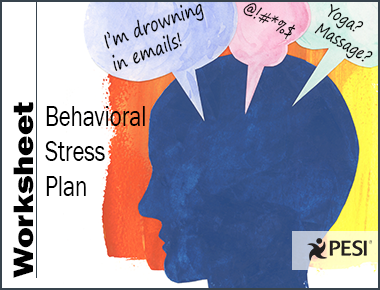Behavioral Stress Tolerance Plan: A worksheet for therapists and clients

This morning I got up late, couldn’t find the toothpaste, and was down to my last pair of matching socks. In Houston, the traffic is as variable as a Loch Ness Monster sighting making my hectic morning more frazzled. I arrived late to work, had 78 emails to respond to, prep work for client sessions, and a nagging insistence to confirm an automatic bill payment. Top all of this off with the fact that I hardly slept last night; constantly alerted by a short in our alarm system going off randomly between 1:00am and 4:00am.
Needless to say, I am stressed and tired. I’m not alone. One-third of Americans are living with extreme stress and nearly half of Americans believe that their stress has increased over the past five years (APA).
The 10 most common daily stressors include:
If, like me, you are a therapist with a full caseload, and concerns over billing, office management, session management, and high risk clients, you’re probably feeling some strong levels of stress.
An excellent way to manage both your stress and your client’s is to incorporate a Behavioral Stress Tolerance Plan.
A Behavioral Stress Tolerance Plan is different from most emotional management plans out there for several reasons.
First, it starts with maintenance, which helps the person filling it out identify areas of wellness and how to maintain them. Secondly, it walks you through early warning signs, exacerbation of these signs and your response to slow or stop stress there. Lastly, it identifies community, personal, and professional (i.e., you the therapist) areas of support while also incorporating clear identifiers of success and healing.
Download the Worksheet:
I have found this Behavioral Stress Tolerance Plan to be helpful not only for myself, but also for my clients. The plan is useful regardless of their educational level, background, or emotional inhibition. Here's a sample worksheet filled out with your client.
If you’re ready to have greater control over that creeping STRESS, give the worksheet a try. And if you’re looking for me, you’ll find me at Starbucks grabbing a Dark Roast coffee because it’s a “treatment that works” for me.
Daniel J. Fox, Ph.D. has been treating and specializing in the treatment and assessment of individuals with personality disorders for the last 14 years in the state and federal prison system, universities, and in private practice. He is a licensed psychologist in the state of Texas and has published several articles on personality, ethics, and neurofeedback. He is the author of The Clinician’s Guide to Diagnosis and Treatment of Personality Disorders. His specialty areas include personality disorders, ethics, and neurofeedback.
Needless to say, I am stressed and tired. I’m not alone. One-third of Americans are living with extreme stress and nearly half of Americans believe that their stress has increased over the past five years (APA).
The 10 most common daily stressors include:
- Difficulty focusing at work
- Problematic interactions with a coworker
- Poor communication
- Over-populated “to-do” list
- Lack of time for self-care
- Not able to stay on a time table
- Financial concerns
- Maintaining a daily schedule
- Poor sleep
If, like me, you are a therapist with a full caseload, and concerns over billing, office management, session management, and high risk clients, you’re probably feeling some strong levels of stress.
An excellent way to manage both your stress and your client’s is to incorporate a Behavioral Stress Tolerance Plan.
A Behavioral Stress Tolerance Plan is different from most emotional management plans out there for several reasons.
First, it starts with maintenance, which helps the person filling it out identify areas of wellness and how to maintain them. Secondly, it walks you through early warning signs, exacerbation of these signs and your response to slow or stop stress there. Lastly, it identifies community, personal, and professional (i.e., you the therapist) areas of support while also incorporating clear identifiers of success and healing.
Download the Worksheet:
Behavioral Stress Tolerance Plan
I have found this Behavioral Stress Tolerance Plan to be helpful not only for myself, but also for my clients. The plan is useful regardless of their educational level, background, or emotional inhibition. Here's a sample worksheet filled out with your client.
If you’re ready to have greater control over that creeping STRESS, give the worksheet a try. And if you’re looking for me, you’ll find me at Starbucks grabbing a Dark Roast coffee because it’s a “treatment that works” for me.
Daniel J. Fox, Ph.D. has been treating and specializing in the treatment and assessment of individuals with personality disorders for the last 14 years in the state and federal prison system, universities, and in private practice. He is a licensed psychologist in the state of Texas and has published several articles on personality, ethics, and neurofeedback. He is the author of The Clinician’s Guide to Diagnosis and Treatment of Personality Disorders. His specialty areas include personality disorders, ethics, and neurofeedback.


